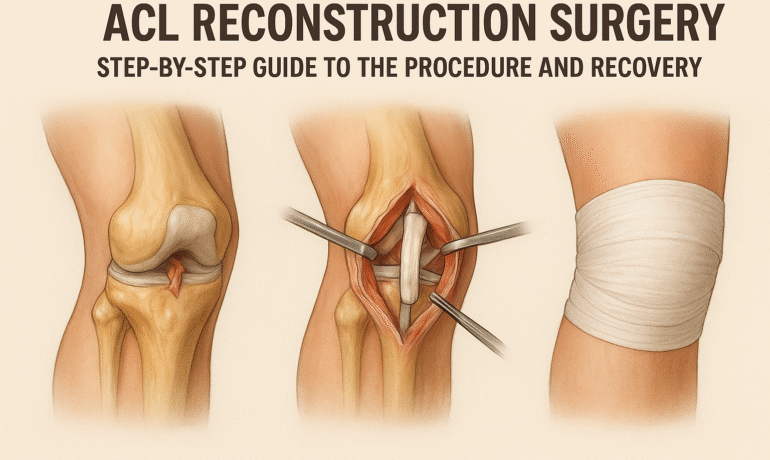Anterior Cruciate Ligament (ACL) injuries are among the most common knee problems faced by athletes and active individuals. When the ligament is torn, ACL reconstruction surgery becomes the gold-standard treatment to restore knee stability and mobility. This detailed guide explains the surgical procedure, recovery stages, and expert insights for a successful return to activity.
What is ACL Reconstruction Surgery?
ACL reconstruction is a minimally invasive orthopedic procedure that replaces the torn anterior cruciate ligament with a graft (usually from the patient’s hamstring or patellar tendon). This surgery is performed arthroscopically, ensuring faster healing, less pain, and improved joint function.
When is ACL Surgery Needed?
An ACL tear often results from sudden twisting, jumping, or pivoting movements. Surgery is recommended when:
There is complete ligament rupture
Knee instability affects walking or sports
Non-surgical treatments fail to restore motion
Early diagnosis and MRI evaluation help orthopedic surgeons determine the best surgical plan.
Step-by-Step Procedure of ACL Reconstruction
Preoperative Preparation: The patient undergoes anesthesia, and the knee is sterilized.
Arthroscopic Examination: A tiny camera is inserted to assess the damaged ligament.
Graft Harvesting: A tendon graft (autograft or allograft) is prepared for reconstruction.
Tunnel Creation: Bone tunnels are drilled in the femur and tibia for graft placement.
Graft Fixation: The new ligament is secured using screws or buttons for stability.
Closure: Small incisions are sutured, and a sterile dressing is applied.
This entire ACL reconstruction procedure usually takes around 60–90 minutes.
Post-Surgery Recovery and Rehabilitation
Recovery after ACL reconstruction is a gradual process that focuses on regaining strength and motion:
Week 1–2: Pain management, icing, and gentle knee movements
Weeks 3–6: Physical therapy for improving mobility and balance
Weeks 7–12: Strengthening exercises and gradual weight-bearing
Month 4–6: Return to light jogging and controlled sports activities
Following a structured ACL rehab protocol under expert supervision ensures faster recovery and minimizes reinjury risk.
Tips for a Smooth Recovery
Follow your physiotherapist’s exercise plan regularly
Use knee braces as advised
Maintain a healthy diet rich in protein for graft healing
Avoid high-impact sports until your doctor approves
Regular follow-ups are essential to monitor healing and knee stability.
Conclusion
ACL reconstruction surgery offers excellent outcomes when performed by skilled orthopedic specialists. With proper rehabilitation, patients can safely return to sports and an active lifestyle.
For expert diagnosis, personalized surgical care, and complete recovery support, consult our Dr. Vinaykumar H — your trusted orthopedic and sports injury specialist.

